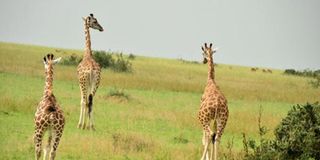Tourism must preserve welfare of wild animals

What you need to know:
Prior to Covid-19, tourism was Uganda’s leading foreign exchange earner, fetching approximately $1.6b annually
Uganda’s tourism sector has experienced tremendous growth, thanks to the government intervention, private sector players and the communities neighbouring conservation areas. Prior to Covid-19, tourism was Uganda’s leading foreign exchange earner, fetching approximately $1.6b annually.
The sector is still projected to further grow and to create employment, investment opportunities, bring in foreign currencies, which are beneficial for the Gross Domestic Product. This is because infrastructure in form of air transport and better roads and hotels are setup and upgraded. Then we can fully enjoy the benefits of our natural resources and wave goodbye to our longtime buddy; poverty.
The tourists bring us a lot of great things and their activity is generally well received. However as the numbers of tourists grow, their interactions with the wildlife habitat and the wildlife themselves increases. Even the investment in the sector puts enormous stress on local land use, and can lead to soil erosion, increased pollution, natural habitat loss, and more pressure on endangered species.
Due to its nature, tourism has many branches run by different people specialised in their fields such as drivers and guides, and what they do in the course of their duties matters a lot in the promotion of natural resources management since they are the front liners.
The front liners and their activities are felt by the wildlife and this affects the latter’s welfare in many ways. The ability of the wildlife to enjoy their habitat and also to perform some physiological and biological functioning are altered by it. This will, therefore, affect how they react to certain situations, which might be dangerous to our rangers and even to fellow tourists.
This can bring aggression among those with young ones and if they feel threatened, that would be a disaster. This is because it can affect their feeding patterns, their social interactions and even forces them to move away from areas with such occurrences. This can be as a result of leisure activities such as flying drones too close to the wild animal and also off tracking to other places where it is not allowed and, therefore, putting the lives of their clients at risk. For instance, when you meet an elephant with high level of testosterone with young ones or one that is a survivor of human wildlife conflicts, it can be violent.
The effect of all these minor interactions are either felt immediately or will be experience in the long run as it will lead to changes in our wildlife population, which might require some drastic management measures.
Waste management by the tour companies, their clients, and other proprietors in the industry can also affect the wildlife negatively. A floating polythene in a water body might be taken as aquatic organism and, therefore, consumed by the animals and birds, and since they are indigestible, they will settle in the stomach with no space for food and the animal dies of starvation.
Some of the disposables such as polythene and snack wrappers are eaten up along with vegetation, bottle tops gets lodged in between the hooves of the animals such as the warthogs, jobs, Jackson’s hartebeest, and this with time causes serious injuries to the animals.
Therefore each tourist vehicle can be an ambassador for conservation and sustainable tourism by having waste bins, which are off loaded in the various resting points along the way and put a sign inside their van to remind our wildlife visitors to properly disposal off of waste in the recommended places.
The guides should never give up on the domestic tourists and remind them of the need for proper waste management and the parks regulations as most of them are stubborn. The responsible authorities should provide guidelines and regulations to promote the welfare of the animals for greater yield and benefits.
Together we can make tourism much more Beneficial to our wildlife, environment and even to the people.
Erick Onenrwot, farmer and conservationist




